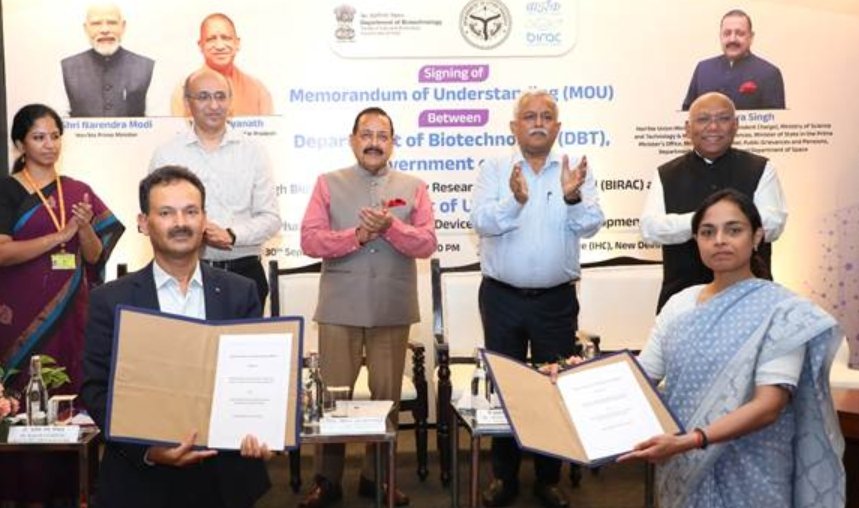Biotech crops reduce pesticide use, green house emissions: Global study
April 11, 2006 | Tuesday | News
Biotech crops reduce pesticide use
Biotech crops reduce pesticide use, green house
emissions: Global study
An eminent agricultural economist, Graham Brookes, specializes in
examining the impact of policy, trade agreements and technology change or
agricultural and related sectors. He also has been providing research and
consultancy in the farm sector for a wide range of clients in both public and
private sectors. During his recent visit to India, he shared the findings of his
study "GM Crops: The global socio-economic and environmental impact-the
first nine years 1996-2004". Excerpts from the report in the Indian
context:
After almost a decade of commercialization, biotech crops
have made a significant impact on the global economy and environment, decreasing
the reliance on pesticides and reducing the environmental footprint associated
with pesticide use by 14 percent, according to a global study on the
socio-economic and environmental impact of biotech crops.
"Since 1996, adoption of biotech crops has contributed
to reducing greenhouse gas emissions from agriculture and decreased pesticide
spraying," said Graham Brookes, director of UK-based consulting firm PG
Economics and one of the authors who conducted the study. Sharing the findings
of his study, he said, "While greatly enhancing, the way farmers in 18
countries produce food, feed and fiber, biotech crops have reduced the
environmental footprint associated with agricultural practices. This study
offers the first quantifiable global look at the impact of biotech crop
production."
The study, "GM Crops: the global socio-economic and
environmental impact-the first nine years 1996-2004," reported that
biotech crops contributed to significantly reduced greenhouse gas emissions from
agricultural practices. This reduction results from decreased fuel use, about
475 million gallons in the past nine years and additional soil carbon
sequestration because of reduced ploughing or improved conservation tillage
associated with biotech crops. In 2004, this reduction was equivalent to
eliminating more than 22 billion pounds of carbon dioxide from the atmosphere or
removing 5 million cars-10 percent of cars registered in India-from road for
one year.
Globally insect resistant cotton has increased farm income by
$ 5.7 billion since commercialization. GM insect resistant Bt cotton has been
planted commercially in India since 2002. According to the study, in India the
adoption of insect-resistant cotton has increased its farm income by Rs 558
crore.
Since the authors of the study were not able to identify
relevant insecticide usage data by active ingredient for conventional and GM
insect resistant cotton in India, the insecticide usage data from Australia and
China was used as they are the nearest countries using the technology in terms
of the climate. The respective differences for pesticide active ingredient use
and field Environmental Impact Quotient (EIQ) values for GM and conventional
cotton used as the basis for the analysis in India were: Conventional cotton-average
volume of insecticide used was 8.5 kg/ha and a field EIQ/ha value of 256/ha; GM
Cotton-average volume of insecticide used was 2.82 kg/ha and a field EIQ/ha
value of 60/ha.
Based on these values the level of insecticide active
ingredient use and the total EIQ load, in India in 2004 was respectively 4.2
percent (2.84 million kg) and 4.3 percent (98 million EIQ/ha units) lower than
would have been expected if the total crop had been conventional non-GM cotton.
Cumulatively, since 2002, the insecticide active ingredient use was 1.8 percent
lower (3.66 million kg) and the total EIQ load 2 percent lower.
The study found that globally biotech crops have reduced the
volume of pesticide spraying by 6 percent since 1996, a decrease of 380 million
pounds according to the study. That is equivalent to eliminating 1,514 rail cars
of pesticides' active ingredient. The largest environmental gains from changes
in pesticide spraying have been from biotech soybeans and cotton, which have
reduced the associated environmental footprint by 19 and 17 percent,
respectively.
According to the report, the industrialized nations of the
United States and Canada, as well as the developing nations of China, South
Africa and Argentina, experienced the greatest reductions in the environmental
impact of crop production. "As the world is increasingly focused on the
need to reduce greenhouse gas emissions, it is clear biotech crops are already
making an important positive contribution to achieving this goal," Brookes
added.
In addition to environmental gains from the biotech crops,
substantial net economic benefits at the farm level have been realized. Since
1996, global farm income has increased by a cumulative total of $27 billion
derived from a combination of enhanced productivity and efficiency gains. This
increase in farm income is equivalent to adding 3-4 percent to the value of
global production of the four main biotech crops. Herbicide-tolerant soybeans
have generated the greatest gains at more than $17 billion in increased income,
while biotech cotton farmers improved their income by $6.5 billion in the past
nine years.
In addition to the significant measurable benefits, valuable
indirect benefits that are more difficult to quantify can be credited to biotech
crop adoption. These include increased management flexibility, facilitating
reduced tillage practices, reduced production risk and improved crop quality.
The report stated that more than 8.25 million farmers in 18 countries around
the world have adopted biotech crops, and 90 percent of those are resource-poor
producers located in developing countries.












